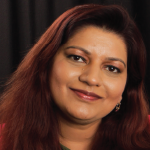A: Unleash your creativity! Rheumatology needs creative solutions to the complex problems encountered by people with arthritis. If you’re primarily a researcher, we need scientifically solid testing of your best and most innovative ideas. If you’re primarily in clinical practice, we need creative adoption and implementation of the latest innovations.
Outstanding Student in Rheumatology Award
 Priti Prasad, MS, PhD
Priti Prasad, MS, PhD
Senior Associate, Oncology Therapeutic Area, Regulatory Affairs, Amgen, Thousand Oaks, Calif.; PhD, Molecular Toxicology Interdepartmental Doctoral Program, University of California–Los Angeles (UCLA)
Background: Across two continents and three degrees, Dr. Prasad has honed her interest in evaluating—and combating—the negative impacts of drugs, toxins and environmental agents on the human body. In particular, she’s focused on detrimental effects to the chronic and complex inflammatory/immune-related diseases rheumatologists treat.
“There are not any specific targeted therapies to treat lupus,” she says. “This was my motivation [to focus on rheumatology], and I tried to discover a cell-specific target during my doctoral studies.”
Dr. Prasad completed a Bachelor of Science in zoology and a Master’s of Science/Research Fellowship in toxicology in New Delhi, India, before relocating to the U.S. in 2000. She then spent several years as a regulatory specialist and scientist for private industry.
“However,” she writes in her award statement, “I realized that to be a proficient scientist with the ability to ask important questions and design research projects to address those questions, it’s essential to attain comprehensive scientific knowledge.”
Her thought process panned out well. She wrapped up a seven-year doctoral degree in molecular toxicology at UCLA in June. She has co-authored a book chapter on lupus, and presented novel work investigating cellular and molecular mechanisms by which a hydrocarbon oil impacts patients with lupus.
Q: In summing up your rheumatology schooling, what’s the elevator speech you’d give a group of students or residents?
A: Focus on your work, keeping the big picture in mind—not your personal gain. Our research work does have an impact on improving human lives.
Q: What was the value of mentoring to you?
A: I worked as a teaching assistant for a laboratory life science course for three quarters at UCLA and mentored five undergraduate students in the research laboratory I worked at as a doctoral student. Mentoring/teaching was a very valuable experience for me because it was a way of giving back to society. Mentoring is time consuming and requires patience. The reward is your contribution to a student’s academic/professional life. My students have stayed in touch with me even after years have gone by.



